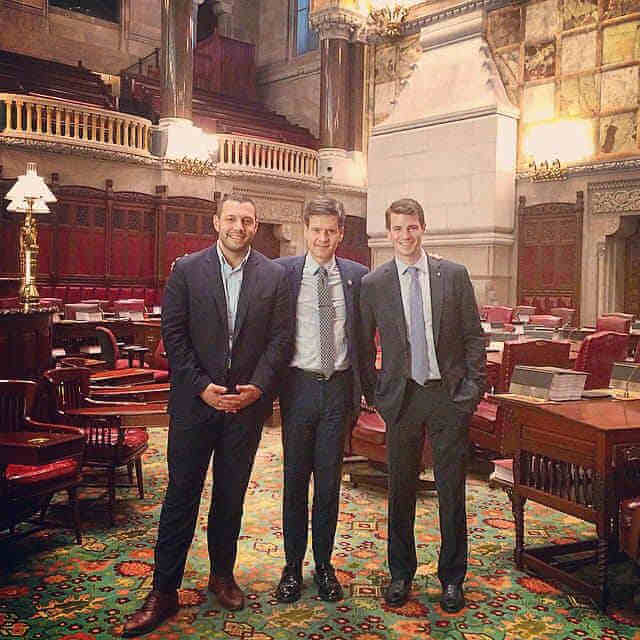The Sixth Circuit Court of Appeals found that transgender funeral director Aimee Stephens’ firing was an illegal case of sex discrimination. | ACLU.ORG
BY ARTHUR S. LEONARD | A unanimous three-judge panel of the Cincinnati-based US Sixth Circuit Court of Appeals ruled on March 7 that a Michigan funeral home violated federal anti-discrimination law by terminating a funeral director who announced she would be transitioning during her vacation and return to work as a woman.
Rejecting a ruling by US District Judge Sean F. Cox that the funeral home’s action was protected by the federal Religious Freedom Restoration Act (RFRA), Circuit Judge Karen Nelson Moore wrote for the court that the government’s “compelling interest” in eradicating employment discrimination because of sex took priority over the religious beliefs of the funeral home’s owner.
This is the first time that any federal appeals court has ruled that RFRA would not shelter an employer from a gender identity discrimination claim by a transgender plaintiff. The Sixth Circuit has in the past allowed Title VII claims under the 1964 Civil Rights Act by transgender plaintiffs under a “gender stereotype” theory with a specific fact pattern, but this is also the first time it explicitly endorsed the Equal Employment Opportunity Commission’s conclusion that gender identity discrimination is necessarily a form of sex discrimination, directly prohibited by Title VII. Judge Moore drew a comparison to a Title VII decision by the Seventh Circuit in the Hively case, which held similarly that sexual orientation discrimination against Kimberly Hively by Ivy Tech Community College, an Indiana school, is a form of sex discrimination.
Sixth Circuit adopts EEOC view that gender identity discrimination violates ’64 Civil Rights Act
Alliance Defending Freedom’s involvement as volunteer counsel for the funeral home makes it likely the Supreme Court will be asked to review this ruling.
The lawsuit was filed by the EEOC, the federal agency responsible for enforcing Title VII, which sued after investigating Aimee Stephens’ administrative complaint that she had been unlawfully terminated. When the EEOC appealed the adverse district court ruling, Stephens, represented by the American Civil Liberties Union, was granted standing to intervene as co-plaintiff in the appeal.
Stephens worked for R.G. & G.R. Harris Funeral Homes, Inc., a closely-held, for-profit corporation that operates three funeral homes. Its owner, Thomas Rost, identifies himself as a Christian who espouses the religious belief that “the Bible teaches that a person’s sex is an immutable God-given gift,” and that he would be “violating God’s commands if he were to permit one of the Funeral Home’s funeral directors to deny their sex while acting as a representative of the organization” or if he were to “permit one of the Funeral Home’s male funeral directors to wear the uniform for female funeral directors while at work.”
“In particular,” Moore wrote, “Rost believes that authorizing or paying for a male funeral director to wear the uniform for female funeral directors would render him complicit ‘in supporting the idea that sex is a changeable social construct rather than an immutable God-given gift.’”
Prior to the Supreme Court’s 2014 Hobby Lobby decision — which allowed that family-held company an exemption from the Affordable Care Act’s contraception coverage requirement in employer health plans — there was no high court authority for the proposition that a funeral home, or any other for-profit business, could claim to “exercise religion.” The majority in that case, however, ruled that because business corporations are defined as “persons” in the US Code, they enjoy the same protection as natural persons under RFRA — at least in cases involving closely-held corporations like Hobby Lobby, with a small group of shareholders who share the same religious beliefs.
Interestingly, had Stephens brought her own lawsuit, this would not have been an issue, since the Sixth Circuit does not impose RFRA restrictions on private plaintiffs. Since EEOC is the plaintiff, however, this is a case of the government seeking to impose a burden on the free exercise of religion by a business corporation, and RFRA is implicated.
The Sixth Circuit panel concluded that Judge Cox erred on several key points in his analysis of the funeral home’s summary judgment motion.
Though Cox determined that the Sixth Circuit does not recognize gender identity claims per se under Title VII, he was bound by circuit precedent to find that Stephens had a potentially valid discrimination claim on the theory she was fired for failing to conform to her employer’s stereotype about how men are supposed to present themselves and dress in the workplace. But Cox concluded that ordering a remedy for Stephens would substantially impair the funeral home’s rights under RFRA and granted summary judgment to Rost.
After reviewing the court’s prior transgender discrimination decisions, Moore concluded that the EEOC’s view of Title VII to cover gender identity discrimination directly, without reference to sex stereotypes, is correct.
“First,” she wrote, “it is analytically impossible to fire an employee based on that employee’s status as a transgender person without being motivated, at least in part, by the employee’s sex.”
Then referring to the Seventh Circuit’s Hively ruling last year, she added, “Here, we ask whether Stephens would have been fired if Stephens had been a woman who sought to comply with the women’s dress code. The answer quite obviously is no. This, in and of itself, confirms that Stephens’ sex impermissibly affected Rost’s decision to fire Stephens.”
Moore also wrote, “Gender (or sex) is not being treated as ‘irrelevant to employment decisions’ if an employee’s attempt or desire to change his or her sex leads to an adverse employment decision.”
Pointing to an earlier Sixth Circuit ruling on transgender discrimination, Smith v. City of Salem, that was based on a sex stereotyping finding, Moore wrote, “We did not expressly hold in Smith that discrimination on the basis of transgender status is unlawful, though the opinion has been read to say as much – both by this circuit and others. Such references support what we now directly hold: Title VII protects transgender persons because of their transgender or transitioning status, because transgender or transitioning status constitutes an inherently gender non-conforming trait.”
In light of this conclusion, the funeral home would have to show it was entitled to an exception. Here, the court found that requiring the funeral home to employ Stephens after her transition would not impose a “substantial” burden within the meaning of RFRA. Rost had suggested two ways in which a substantial burden would be imposed. First, he suggested, letting Stephens dress as a woman “would often create distractions for the deceased’s loved ones and thereby hinder their healing process (and the Funeral Home’s ministry),” and second, “forcing the Funeral Home to violate Rost’s faith would significantly pressure Rost to leave the funeral industry and end his ministry to grieving people.”
The court did not accept either justification.
For one thing, a basic tenet of anti-discrimination law is that businesses may not rely on customer preferences or biases as an excuse to refuse to employ people for a reason forbidden by Title VII. The court also rejected Rost’s argument that the EEOC’s position forced him to choose between violating his religious beliefs by, for example, paying for a women’s uniform for Stephens to wear, or otherwise quitting the funeral business. The court pointed out that there is no legal requirement for Rost to pay for uniforms for his staff. (In Hobby Lobby, in contrast, the issue was a regulation requiring employers to bear the cost of contraceptive coverage.)
Further, wrote Moore, “simply permitting Stephens to wear attire that reflects a conception of gender that is at odds with Rost’s religious beliefs is not a substantial burden under RFRA,” because “as a matter of law, tolerating Stephens’ understanding of her sex and gender identity is not tantamount to supporting it.”
The court would typically have reversed the summary judgment and sent the case back to the district court to determine whether a trial was needed, but no material facts are in dispute in the case, so the Sixth Circuit directly granted summary judgment to the EEOC on its claim that the funeral home violated Title VII and is not entitled to a defense under RFRA. Stephens won on the merits, unless the funeral home is successful in getting the Supreme Court to take the case and reverse.
The appeal was argued for the EEOC by Anne Noel Occhialino, and for Stephens by ACLU attorney John A. Knight. Douglas G. Wardlow of Alliance Defending Freedom argued on behalf of the funeral home. The case attracted amicus briefs from Lambda Legal and Americans United for Separation of Church and State, among a number of groups.
Judge Moore was appointed to the court by President Bill Clinton, while the other judges on the unanimous panel —Helene N. White and Bernice W. Donald — were appointed by George W. Bush and Barack Obama, respectively.


































